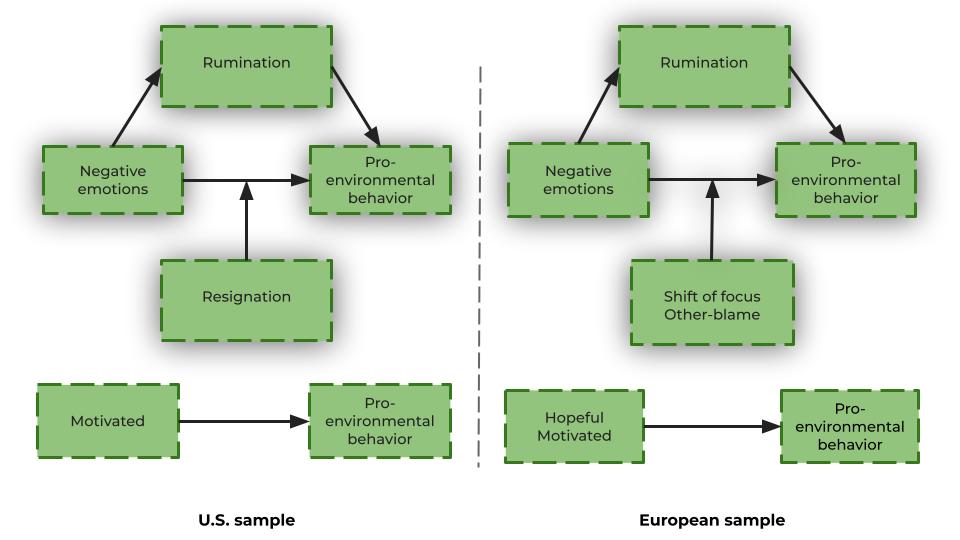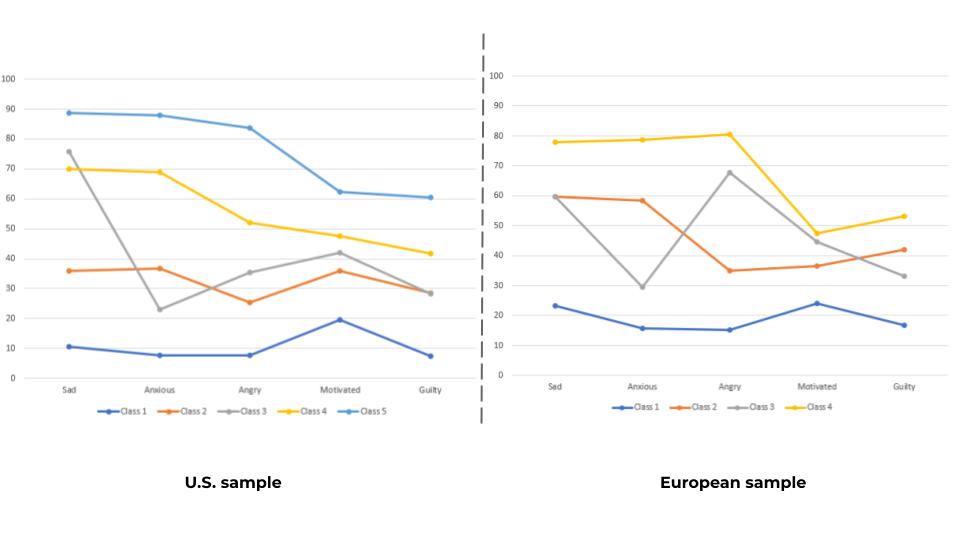Featured
Unleashing the Power of Emotional Responses for Pro-Environmental Action

Image above: The Sourdough Fire, a wildfire in North Cascades National Park, looking north from the Pyramid Lake Trailhead on State Route 20. SounderBruce, CC BY-SA 4.0, via Wikimedia Commons
- The negative emotions of anger, sadness, guilt, and anxiety, as well as the positive feeling of motivation, are associated with increased engagement in sustainable actions.
- Ruminating (i.e., recurrently dwelling) on environmental concerns is positively associated with individuals’ motivation to take action.
- The relationship between pro-environmental behavior and negative emotions is slightly weaker among people who use emotion regulation strategies that reframe negative thoughts and distract from negative emotions, such as shifting of focus.
- The relationship between pro-environmental behavior and negative emotions is slightly weaker among people who use resignation as an emotion regulation strategy, i.e., giving up or feeling helpless.
- Engaging in pro-environmental behavior not only benefits the individual’s mental health but also contributes to wider societal impacts. Indeed, pro-environmental behavior can trigger spillover effects, creating a ripple of positive changes in individuals and their communities.
Emotions and emotion regulation strategies as catalysts for pro-environmental behavior • The benefits of climate action on the individual and societal levels • About the authors
Ominous reports about the climate crisis and global warming have been headlining news for several years. In the bushfire season of 2019, Australia faced forest fires that were unprecedented in their scale and severity (Ward et al., 2020). In 2021, Germany, the Netherlands, and Belgium were struck by intense rainfall, leading to floods and 200 deaths (United Nations Regional Information Centre for Western Europe, 2022). That same year, intense rainfall in Zhengzhou, China, flooded the city’s subway, trapping people inside overflowing carriages (Davidson, 2021). In the horn of Africa, flash floods and heavy rain in March 2023 disrupted one of the most severe droughts in history, causing several deaths and swamping cropland (Cassidy, 2023). Also in the first half of 2023, Canada’s carbon dioxide emissions from wildfires reached historic levels (“Canada’s Wildfire Carbon Dioxide Emissions”, 2023). The consequences of the climate crisis are difficult to predict and often underestimated.
In its latest report, the Intergovernmental Panel on Climate Change (IPCC, 2023) identified key risks from rising global temperatures, including water scarcity, food insecurity, flooding, droughts, heat extremes, weather extremes, increasing epidemics, and major loss of assets and human lives, to name a few examples. Confronted with these facts and reports about the environment, what kind of emotions are triggered? Do people feel hope—assured that the impacts of the climate crisis will be dampened by future technological advancements? Or do people feel guilt, perhaps calling to mind their own wavering motivation to recycle or use public transport? Or does the news make people feel anxious, as if hope has already run out and it is therefore better not to think about environmental concerns at all? Responding effectively might require having strong emotional reactions, but high levels of anxiety can become overwhelming, leading to a lost sense of self-efficacy, along with hopelessness and passivity (Innocenti et al., 2023).
As a group of early-career researchers affiliated with the Junior Researcher Programme, the authors’ main area of research revolves around emotion regulation within the context of climate change. Our aim with this study was to shed light on the profound emotional impacts that climate change exerts on individuals, subsequently influencing their behavior.

Elena Niehoff is an environmental sciences master’s student specializing in environmental policy with a minor in environmental education at Wageningen University & Research (Wageningen, Netherlands). She completed her bachelor’s degree in psychology at the University of Twente. Additionally, she holds a position as a student assistant at the University of Bremen, where she provides support for an analysis exploring the adoption patterns of sustainable technologies. Her research interests revolve around promoting pro-environmental behavior, investigating the impacts of climate change on affected communities, and exploring strategies to effectively implement environmental policies.

Lilla Nóra Kovács is an assistant professor and research fellow at the Institute of Psychology, Eotvos Lorand University (ELTE), Budapest, Hungary. She received her PhD in 2022 at ELTE. Her research focuses on emotion regulation strategies in healthy adults and clinical populations. In 2021 Lilla completed a one-year Fulbright scholarship as a visiting researcher at the University of Colorado Boulder, where she investigated emotional reactivity in bipolar disorders. She currently investigates emotional responses to the climate crisis and their relationship with pro-environmental behavior.

Frida Berglund is completing her master’s degree in clinical psychology at Uppsala University, Sweden. Her master’s thesis is about cognitive dysfunctions in patients with a rare somatic condition called idiopathic intracranial hypertension. She is also working to promote sexual health and satisfaction, primarily with clients in correctional facilities, jails, and prisons.

Ben Holden completed his undergraduate degree in experimental psychology at St. Catherine’s College, University of Oxford, United Kingdom. He is currently working at Brasenose College, Oxford, as outreach and school liaison coordinator. He is interested in further researching the relationship between emotions and decision-making and how emotional responses impact politically charged behaviours such as climate action and misinformation belief.

Gesine Jordan is a doctoral researcher in the Cognition, Learning, and Educational Assessment Research group at the University of Luxembourg. Her research focuses on intra- and interpersonal emotion regulation in academic settings. Furthermore, she is interested in how emotion regulation affects parenting as well as educational and societal outcomes. She completed her studies in psychology at the University of Vienna and the University of Groningen.

Felicia Pohl completed her master’s degree in clinical psychology, specializing in psychotherapy, at the University of Warsaw, Poland. Despite a clinical background, she is passionate about research and has previous experience studying post-traumatic stress disorder in patients with cerebral aneurysms, neurocognitive impairments post-COVID-19, and the role of peer support in group-treatment settings. She is also interested in researching virtual-reality techniques in psychological interventions.

Mariem Younssi completed her first year of master’s studies in neuropsychology and cognitive psychopathology at Côte d’Azur University, Nice, France. She will be pursuing her second year in multidisciplinary perspective on cognition at the University of Toulouse Jean Jaurès, France. Her main research interest is understanding the role of different memory systems in the formation and expression of implicit biases.

Ines Zevallos Labarthe completed her master of research in sustainable futures at the University of Bath, United Kingdom She studied clinical psychology as an undergraduate at the Universidad Peruana de Ciencias Aplicadas. Her research interests are mainly around climate psychology and environmental education. She is passionate about promoting nature connectedness and sustainability education amongst young people. She is interested in further researching the mental health benefits of promoting environmental awareness in young children.

Gyöngyi Kökönyei is an associate professor in the Department of Clinical Psychology and Addiction, Institute of Psychology, Eötvös Loránd University (ELTE), Budapest, Hungary. She also works as a researcher consultant at NAP3.0-SE Neuropsychopharmacology Research Group, Hungarian Brain Research Program, Budapest (Semmelweis University). Her research focuses on emotion regulation—particularly the relationship between rumination and mental and physical health—using a variety of approaches and methods including self-report questionnaires, cognitive paradigms (such as dot-probe, emotional Stroop, Implicit Association Test), psychophysiological measurements, and functional magnetic resonance imaging of the brain.
Emotions and emotion regulation strategies as catalysts for pro-environmental behavior
Emotions play crucial roles in decision-making processes, attention, and thoughts, and therefore are primary drivers of human behavior (Izard, 2009; Feldman & Hart, 2018; Lerner et al., 2015, Brosch et al., 2013). Faced with the loud ticking of the climate clock, it is vital to understand how to harness emotional reactions to motivate the public for action. Previous research found emotions to be significant predictors of pro-environmental behavior (Whitmarsh et al., 2022). However, other studies have shown that the results are complex: Negative emotions motivate pro-environmental behavior (Pihkala, 2022; Stanley et al., 2021), but feeling too overwhelmed can inhibit the same behaviors, creating a paralyzing effect (Stanley et al., 2021; Innocenti et al., 2023).
Similarly, positive emotions can also promote pro-environmental behavior (Feldman & Hart, 2016, 2018), but feeling too optimistic can lead to inaction by creating a false sense of security (Hornsey & Fielding, 2016, 2020). To promote pro-environmental behavior, it appears that a precarious balance of positive and negative emotions needs to be harnessed.
One factor that has been neglected so far in climate-emotions research is the human tendency to regulate most emotions that emerge. Emotion regulation is the process of managing and modulating our own emotions, which may amplify or dampen the emotional experience. Emotion regulation may occur automatically or consciously and may be beneficial or harmful for mental well-being (Gross, 1998). Being capable of decreasing our negative emotions about the climate crisis seems beneficial for our mental well-being, but what if the cost of implementing these strategies is that climate action is hindered? The more we understand these complex dynamics, the more we can tailor potential intervention strategies to boost pro-environmental behavior through education and policymaking.
Read all of the articles from the September/October Observer.
Our new study, now published on a preprint server, set out to contribute to this increased understanding by investigating the role of climate emotions and emotion regulation strategies and their association with pro-environmental behavior. We conducted a large-scale quantitative survey study with more than 1,300 adult participants from six European countries (Austria, France, Germany, Hungary, Sweden, and the United Kingdom) and more than 1,000 participants from the United States, representative of age, sex, and race. Participants were asked how they felt regarding climate change (sad, anxious, angry, guilty, hopeful, motivated), how they regulated their negative climate emotions (if any), and how much they were willing to take pro-environmental action (e.g., conserving energy, recycling waste, cycling or taking public transport instead of driving, buying used goods, or engaging in climate activism). Because the regulation of climate emotions has not been studied elsewhere, we carefully selected the emotion regulation most relevant in the context of climate emotions and created a 16-item questionnaire for their measurement in five languages (English, German, French, Swedish, and Hungarian).
Our selected emotion regulation strategies were rumination, resignation, other-blame, and shift of focus.
- Rumination is passively dwelling on the causes and consequences of an emotionally relevant experience (e.g., “My thoughts about climate change keep coming into my head even when I do not wish to think about them”). Rumination is largely automatic and may be harmful for mental health, as it amplifies the perceived importance of the stressor (Gerin et al., 2012; Nolen-Hoeksema, 2000).
- Resignation refers to how much one feels helpless or like giving up, leading to the belief that our actions will not make a difference (e.g., “I think that I cannot change anything about climate change”) (Wolgast et al., 2013).
- Blaming others is to hold other people or external factors responsible rather than taking personal responsibility (e.g., “I feel that others are responsible for climate change”) (Garnefski & Kraaij, 2006). Whether this strategy is adaptive or not highly depends on the context (Kuppens & Van Mechelen, 2007): Pointing fingers at others or at the circumstances instead of taking responsibility for our own actions is a harmful habit; however, carrying the weight of responsibility for events that are beyond our control—such as the climate crisis—could have detrimental effects on mental health.
- Shift of focus refers to directing attention away from the source of negative emotions either by actively changing the interpretation or meaning of the situation commonly referred to as cognitive reappraisal (e.g., “When I’m faced with climate change, I make myself think about it in a way that helps me stay calm”) (McRae et al., 2012) or by diverting attention to an alternative stimulus or thought—commonly referred to as distraction (e.g.,“When a negative thought about climate change comes up, I immediately try to think of something else”) (Sheppes et al., 2011).
Our study found that stronger negative emotional reactions to the climate crisis were associated with more pro-environmental behavior in both samples (see Fig. 1). In the European sample, feeling hopeful and motivated were also associated with pro-environmental behavior, whereas, in the U.S. sample, only feeling motivated was associated with pro-environmental behavior. The relationship between hope and pro-environmental action was the weakest of all associations. Consequently, negative emotions might be more motivating to protect the planet than feeling hope.

What about the role of emotion regulation strategies—do they influence this association? Our study indicated that emotion regulation amplified negative climate emotions, which again were related to more action (see Fig. 1). More specifically, negative climate emotions were associated with higher tendencies to ruminate about the environment, which, in turn, were related to more pro-environmental behavior in both samples. In other words, individuals who tend to contemplate the challenges of our planet seem to be more motivated to take action to address them.
In the U.S. sample, there was a slightly weaker positive association between negative emotions and pro-environmental behavior among individuals who engaged in resignation compared with people who did not. This might be because of a reduced sense of self-efficacy. In the European sample, the positive association between negative emotions and pro-environmental behavior was slightly weaker among individuals who engaged in shifting focus (i.e., diverting their attention from disturbing news about the climate crisis or looking at the news from another angle), perhaps as an attempt to downregulate their negative climate emotions. Although shifting focus may be important in preserving mental health, and resignation may represent a form of self-defense against negative emotions, these strategies might also slightly reduce people’s motivation to take climate action. Similarly, ruminating about the climate crisis may be accompanied by stronger negative climate emotions, but it also seems to motivate people to take more pro-environmental action.

As can be seen in Figure 2, we identified four to five distinct profiles of emotional responses within the two samples. These groups differed in their use of emotion regulation strategies and their willingness to take climate action. In both samples, there was a distinct group of people demonstrating strong climate emotions (class 5 in the U.S.; class 4 in the EU), and a group with very low or no climate emotions (class 1 in the U.S. and EU) (alongside two groups with moderate emotional intensity for the European, and three for the U.S. sample).
Our findings also revealed that members of the emotional group were more likely to take climate action and engage in other-blame and rumination regarding the environment than the unemotional group. This is understandable given that other-blame and rumination are generally triggered by strong negative emotions (Kuppens & Van Mechelen, 2007; Nolen-Hoeksema, 2000). Furthermore, in the U.S. sample, members of the emotional group also engaged more in shifts of focus, perhaps as an attempt to mitigate their negative climate emotions. In the European sample, the unemotional group demonstrated more resignation, suggesting that dampened emotional reactions often accompany the impression that nothing can be done to mitigate the climate crisis. These results indicate that negative emotions such as climate anxiety, sadness, anger, and guilt seem to outweigh optimism about the future of the planet in motivating climate action.
The benefits of climate action on the individual and societal levels
Collectively, these results suggest that people may need to choose between (1) not stressing too much about the climate crisis and consequently being slightly less motivated to take action and (2) experiencing strong negative climate emotions and being more motivated to take climate action. But requiring humanity to sacrifice mental health in order to take climate action seems unsustainable. So we asked, what can be done?
The good news is that research shows engaging in pro-environmental behavior may be beneficial to mental health. Activism could be a protective factor against negative climate emotions (Australian Psychological Society, 2017) such as feeling hopeless (DeAngelo et al., 2016), and acting can help people gain a sense of control, which has been associated with better mental health (Veronese et al., 2017). Combating negative emotions through action can create feelings of relief and empowerment (Drury et al., 2005) that may in turn reduce negative climate emotions. Intervention strategies should promote this cycle: When messages about the climate crisis are presented, they should include a means to act that people can implement in their everyday lives. This way, people may channel their negative climate emotions to pro-environmental action instead of trying to get rid of them.
By understanding people’s climate-related emotions and values, policymakers can design bold and effective policies that encourage social engagement and promote pro-environmental behavior (Whitmarsh et al., 2022). As the IPCC (2023) report highlighted, combining bottom–up and top–down policy approaches can have significant impacts for achieving sustainable development targets that recognize the relevance of citizen involvement in shaping climate policy (Kythreotis et al., 2019). Thus, policymakers can harness the knowledge from climate-emotions research to tap into emotions like anxiety, anger, guilt, and sadness, and feelings of motivation, utilizing them as catalysts for meaningful climate action and fostering a collective commitment toward a sustainable future.
Furthermore, pro-environmental behaviors need not occur in isolation but may cause spillover effects within individuals and their peers. This is to say, engaging in one climate-friendly behavior is likely to increase the chance of performing another later and may inspire those around you to follow suit (Lacasse, 2019). These effects have been observed to be small, but the climate crisis is a situation in which even small changes (by sufficiently large populations) can have an impact. Likewise, evidence has shown that climate activism can draw larger crowds to protests (Bugden, 2020). Therefore, a few environmentally friendly steps may domino into profound changes. Campaigns promoting environmentally friendly behaviors to increase people’s sense of self-efficacy and reduce their sense of resignation should emphasize this collective impact.
Our findings, in line with other research (e.g., Australian Psychological Society, 2017), suggest acknowledging and managing negative emotions about the environment as a strategy for avoiding climate denial and potentially fostering a greater motivation to participate in pro-environmental actions, both at the level of the individual and beyond. Recurrently talking about the climate crisis and engaging in climate activism can empower knowledgeable communities to exercise political pressure and call for decision-makers to make more sustainable choices, thereby transforming potential anxiety or anger into constructive action.
As the world navigates the challenges posed by climate change, it is important to recognize the central role emotions play in shaping behavior. By embracing our emotions and employing effective emotion regulation strategies, we can become catalysts for positive change. It is crucial for individuals to recognize their emotional connection to the issue, take action, and participate in the global effort to protect our planet. Together, we can create a sustainable future and mitigate the devastating impacts of climate change.
Feedback on this article? Email apsobserver@psychologicalscience.org or login to comment. Interested in writing for us? Read our contributor guidelines.
Australian Psychological Society (2017). The climate change empowerment handbook: Psychological strategies to tackle climate change. [Brochure]. https://psychology.org.au/getmedia/88ee1716-2604-44ce-b87a-ca0408dfaa12/climate-change-empowerment-handbook.pdf
Brosch, T., Scherer, K., Grandjean, D., & Sander, D. (2013). The impact of emotion on perception, attention, memory, and decision-making. Swiss Medical Weekly, 143(1920), Article w13786. https://doi.org/10.4414/smw.2013.13786
Bugden, D. (2020). Does climate protest work? Partisanship, protest, and sentiment pools. Socius, 6. https://doi.org/10.1177/2378023120925949
Canada’s wildfire carbon dioxide emissions hit record high in first six months of 2023. (2023, June 27). The Guardian. https://www.theguardian.com/world/2023/jun/27/canada-wildfires-released-record-breaking-carbon.
Cassidy, E. (2023, March 11). Heavy rains hit drought-stricken horn of Africa. NASA Earth Observatory. https://earthobservatory.nasa.gov/images/151208/heavy-rains-hit-drought-stricken-horn-of-africa
Davidson, H. (2021, July 21). “I might not make it”: Passengers tell of horror as Chinese subway floods. The Guardian. https://www.theguardian.com/world/2021/jul/21/passengers-tell-of-horror-chinese-subway-floods-zhengzhou
DeAngelo, L., Schuster, M. T., & Stebleton, M. J. (2016). California DREAMers: Activism, identity, and empowerment among undocumented college students. Journal of Diversity in Higher Education, 9(3), 216–230. https://doi.org/10.1037/dhe0000023
Drury, J., Cocking, C., Beale, J., Hanson, C., & Rapley, F. (2005). The phenomenology of empowerment in collective action. British Journal of Social Psychology, 44(3), 309–328. https://doi.org/10.1348/014466604X18523
Feldman, L., & Hart, P. S. (2016). Using political efficacy messages to increase climate activism: The mediating role of emotions. Science Communication, 38(1), 99–127. https://doi.org/10.1177/1075547015617941
Feldman, L., & Hart, P. S. (2018). Is there any hope? How climate change news imagery and text influence audience emotions and support for climate mitigation policies. Risk Analysis, 38(3), 585–602. https://doi.org/10.1111/risa.12868
Garnefski, N., & Kraaij, V. (2006). Relationships between cognitive emotion regulation strategies and depressive symptoms: A comparative study of five specific samples. Personality and Individual Differences, 40(8), 1659–1669. https://doi.org/10.1016/j.paid.2005.12.009
Gerin, W., Zawadzki, M. J., Brosschot, J. F., Thayer, J. F., Christenfeld, N. J. S., Campbell, T. S., & Smyth, J. M. (2012). Rumination as a mediator of chronic stress effects on hypertension: A causal model. International Journal of Hypertension, Article 453465. https://doi.org/10.1155/2012/453465
Gross, J. J. (1998). The emerging field of emotion regulation: An integrative review. Review of General Psychology, 2(3), 271–299. https://doi.org/10.1037/1089-2680.2.3.271
Hornsey, M. J., & Fielding, K. S. (2016). A cautionary note about messages of hope: Focusing on progress in reducing carbon emissions weakens mitigation motivation. Global Environmental Change, 39, 26–34. https://doi.org/10.1016/j.gloenvcha.2016.04.003
Hornsey, M. J., & Fielding, K. S. (2020). Understanding (and reducing) inaction on climate change. Social Issues and Policy Review, 14(1), 3–35. https://doi.org/10.1111/sipr.12058
Innocenti, M., Santarelli, G., Lombardi, G. S., Ciabini, L., Zjalic, D., Di Russo, M., & Cadeddu, C. (2023). How can climate change anxiety induce both pro-environmental behaviours and eco-paralysis? The mediating role of general self-efficacy. International Journal of Environmental Research and Public Health, 20(4), Article 3085. https://doi.org/10.3390/ijerph20043085
Intergovernmental Panel on Climate Change. (2023). Climate Change 2023: Synthesis Report. A report of the Intergovernmental Panel on Climate Change. Contribution of working groups I, II and III to the sixth assessment report of the Intergovernmental Panel on Climate Change. [Core Writing Team, H. Lee and J. Romero (eds.)]. IPCC, Geneva, Switzerland, pp. 1–85. https://report.ipcc.ch/ar6syr/pdf/IPCC_AR6_SYR_LongerReport.pdf
Izard, C. E. (2009). Emotion theory and research: Highlights, unanswered questions, and emerging issues. Annual Review of Psychology, 60, 1–25. https://doi.org/10.1146/annurev.psych.60.110707.163539
Kuppens, P., & Van Mechelen, I. (2007). Interactional appraisal models for the anger appraisals of threatened self-esteem, other-blame, and frustration. Cognition and Emotion, 21(1), 56–77. https://doi.org/10.1080/02699930600562193
Kythreotis, A. P., Mantyka-Pringle, C., Mercer, T. G., Whitmarsh, L. E., Corner, A., Paavola, J., Chambers, C., Miller, B. A, & Castree, N. (2019). Citizen social science for more integrative and effective climate action: A science-policy perspective. Frontiers in Environmental Science, 7, Article 10. https://doi.org/10.3389/fenvs.2019.00010
Lacasse, K. (2019). Can’t hurt, might help: Examining the spillover effects from purposefully adopting a new pro-environmental behavior. Environment and Behavior, 51(3), 259–287. https://doi.org/10.1177/0013916517748164
Lerner, J. S., Li, Y., Valdesolo, P., & Kassam, K. S. (2015). Emotion and decision making. Annual Review of Psychology, 66, 799–823. https://doi.org/10.1146/annurev-psych-010213-115043
McRae, K., Ciesielski, B., & Gross, J. J. (2012). Unpacking cognitive reappraisal: Goals, tactics, and outcomes. Emotion, 12(2), 250–255. https://doi.org/10.1037/a0026351
Nolen-Hoeksema, S. (2000). The role of rumination in depressive disorders and mixed anxiety/depressive symptoms. Journal of Abnormal Psychology, 109(3), 504–511.
Pihkala, P. (2022). Toward a taxonomy of climate emotions. Frontiers in Climate, 3, Article 738154. https://doi.org/10.3389/fclim.2021.738154
Sheppes, G., Scheibe, S., Suri, G., & Gross, J. J. (2011). Emotion regulation choice. Psychological Science, 22(11), 1391–1396. https://doi.org/10.1177/0956797611418350
Stanley, S. K., Hogg, T. L., Leviston, Z., & Walker, I. (2021). From anger to action: Differential impacts of eco-anxiety, eco-depression, and eco-anger on climate action and wellbeing. The Journal of Climate Change and Health, 1, Article 100003. https://doi.org/10.1016/j.joclim.2021.100003
United Nations Regional Information Centre for Western Europe (2022, January 21). 2021 floods: UN researchers aim to better prepare for climate risks. https://unric.org/en/2021-floods-un-researchers-aim-to-better-prepare-for-climate-risks/
Veronese, G., Pepe, A., Jaradah, A., Murannak, F., & Hamdouna, H. (2017). “We must cooperate with one another against the enemy”: Agency and activism in school-aged children as protective factors against ongoing war trauma and political violence in the Gaza strip. Child Abuse & Neglect, 70, 364–376. https://doi.org/10.1016/j.chiabu.2017.06.027
Ward, M., Tulloch, A. I. T., Radford, J. Q., Williams A. B., Reside, A. E., Macdonald, S. L., Mayfield, H. J., Maron, M., Possingham, H. P., Vine, S. J., O’Connor, J. L., Massingham, E. J., Greenville, A. C., Woinarski, J. C. Z., Garnett, S. T., Lintermans, M., Scheele, B. C., Carwardine, J., Nimmo, D. J., … Watson, J. E. M. (2020). Impact of 2019–2020 mega-fires on Australian fauna habitat. Nature Ecology & Evolution, 4(10), 1321–1326. https://doi.org/10.1038/s41559-020-1251-1
Whitmarsh, L., Player, L., Jiongco, A., James, M., Williams, M., Marks, E., & Kennedy-Williams, P. (2022). Climate anxiety: What predicts it and how is it related to climate action? Journal of Environmental Psychology, 83, Article 101866. https://doi.org/10.1016/j.jenvp.2022.101866
Williams, J. C., & Lynn, S. J. (2010). Acceptance: An historical and conceptual review. Imagination, Cognition and Personality, 30(1), 5–56. https://doi.org/10.2190/IC.30.1.c
Wolgast, M., Lundh, L.-G., & Viborg, G. (2013). Cognitive restructuring and acceptance: An empirically grounded conceptual analysis. Cognitive Therapy and Research, 37(2), 340–351. https://doi.org/10.1007/s10608-012-9477-0





APS regularly opens certain online articles for discussion on our website. Effective February 2021, you must be a logged-in APS member to post comments. By posting a comment, you agree to our Community Guidelines and the display of your profile information, including your name and affiliation. Any opinions, findings, conclusions, or recommendations present in article comments are those of the writers and do not necessarily reflect the views of APS or the article’s author. For more information, please see our Community Guidelines.
Please login with your APS account to comment.